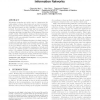Free Online Productivity Tools
i2Speak
i2Symbol
i2OCR
iTex2Img
iWeb2Print
iWeb2Shot
i2Type
iPdf2Split
iPdf2Merge
i2Bopomofo
i2Arabic
i2Style
i2Image
i2PDF
iLatex2Rtf
Sci2ools
136
click to vote
KDD
2010
ACM
2010
ACM
DivRank: the interplay of prestige and diversity in information networks
Information networks are widely used to characterize the relationships between data items such as text documents. Many important retrieval and mining tasks rely on ranking the data items based on their centrality or prestige in the network. Beyond prestige, diversity has been recognized as a crucial objective in ranking, aiming at providing a nonredundant and high coverage piece of information in the top ranked results. Nevertheless, existing network-based ranking approaches either disregard the concern of diversity, or handle it with non-optimized heuristics, usually based on greedy vertex selection. We propose a novel ranking algorithm, DivRank, based on a reinforced random walk in an information network. This model automatically balances the prestige and the diversity of the top ranked vertices in a principled way. DivRank not only has a clear optimization explanation, but also well connects to classical models in mathematics and network science. We evaluate DivRank using empirical...
Data Items | Data Mining | Information Network | KDD 2010 | Ranking |
| Added | 29 Jan 2011 |
| Updated | 29 Jan 2011 |
| Type | Journal |
| Year | 2010 |
| Where | KDD |
| Authors | Qiaozhu Mei, Jian Guo, Dragomir R. Radev |
Comments (0)

